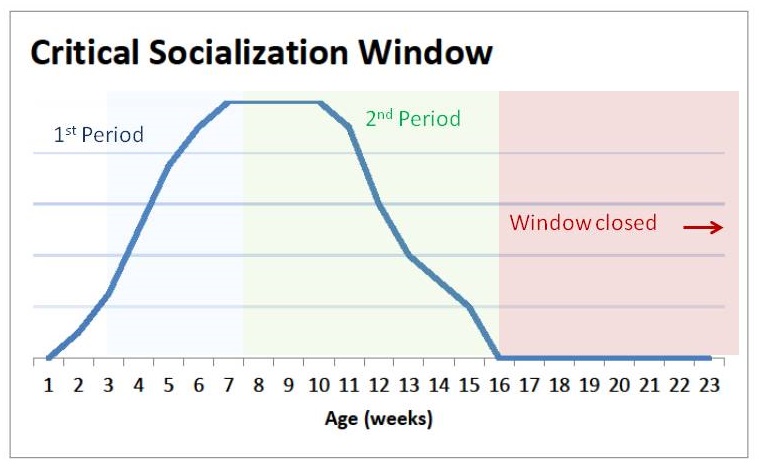What is Socialization?
Part 1
By Angie Madden, CPDT-KA
As an adopter of several reactive shelter dogs (dogs that “react” to other dogs, wildlife, or people by barking, lunging, or growling), I am passionate about getting the word out about properly socializing puppies. Unfortunately, while “socialization” is a word that gets thrown around a lot in dog circles, most people don’t have an understanding of what it truly means or how to properly go about it.
Let’s start with what socialization really means. In her book, Social, Civil, and Savvy, Laura VanArendonk Baugh CPDT-KA KPACTP defines socialization as “the acquisition of cultural habits and social communication to equip an individual to live in society.” To put that in layman’s terms, she tells her clients, “I want a dog to think rationally and proactively about any new stimulus or situation, and I want him to act intentionally and with confidence.”
But why is this process necessary? To answer that question, we need to look at how dogs develop socially. After a puppy is born, he will go through socialization periods which are structured to maximize the species’ survival. The first socialization period occurs when the puppies are still in the den and only interact with family members. The second period occurs between 7-16 weeks of age as the pups begin to explore and experience life in the outside world. In the wild, parents would keep puppies away from danger while they are in this stage of learning, so they are only exposed to “safe” areas, animals, etc. Once this window closes, the pups will be leery of anything new or different as this could be potentially dangerous in nature.

That last sentence is the key to the importance of the socialization process. An adult dog with too much curiosity could end up dead. Therefore, adult dogs are programmed to avoid unfamiliar animals and environments. In the dog’s mind anything different means danger. For this reason, it is imperative that puppies living with humans are taught how to deal with novelty so that they may function in a constantly changing environment with new dogs, people, and locations.
I hope that helps you to understand a little bit more about the importance of socializing your puppy. Next week I will talk a bit more about HOW to properly and fully socialize your puppy. In the meantime, feel free to check out some of these resources for more information:
Resources:
- American Veterinary Society of Animal Behavior Position Statement on Puppy Socialization
- Social, Civil, and Savvy by Laura VanArendonk Baugh, CPDT-KA KPACTP
For more thoughts on the importance of socializing your puppy early on, check out this blog from Dr. Jen Summerfield:
